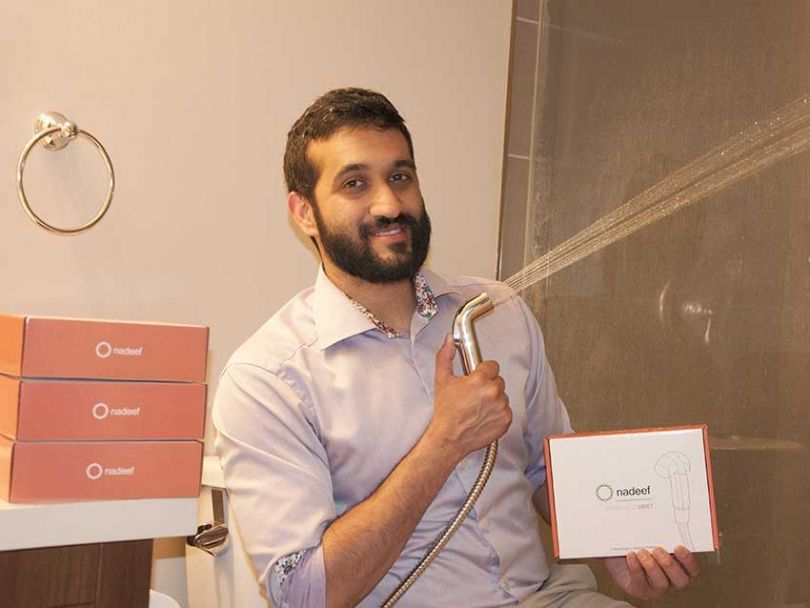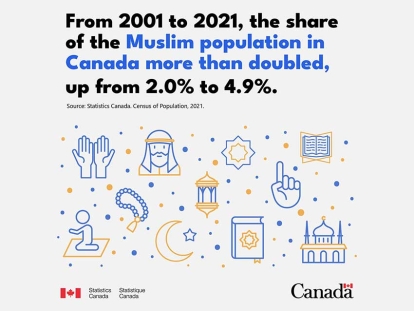 Ahmad Iqbal is the founder of Nadeef Bidet, a company which offers a more hygienic and environmentally friendly alternative to toilet paper.
Ahmad Iqbal
Ahmad Iqbal is the founder of Nadeef Bidet, a company which offers a more hygienic and environmentally friendly alternative to toilet paper.
Ahmad Iqbal
Jun
Pakistani Canadian Hopes to Improve North American Bathroom Hygiene and Save the Environment One Hand-Held Bidet at a Time
Written by Chelby DaigleWhen Ahmad Iqbal moved to North America, he was surprised by this culture’s bathroom habits. A Pakistani Canadian who grew up in the Middle East and Asia, he was used to washing with water after using the toilet. Seeing as this is the religious requirement for all Muslims, bidets are staples of most modern Muslim homes and are even common in countries like South Korea and Japan. However, they are not commonly found in North American households.
But Ahmad hopes to change that. He founded Nadeef (clean in Arabic), a company which sells easy to install hand-held bidets, offering a simple and affordable solution for anyone in North America who wants a more hygienic and environmentally friendly alternative to toilet paper.
Muslim Link interviewed Ahmad about Nadeef Bidet and the lessons he has learned from his experience in business that he hopes will help other aspiring entrepreneurs.
Why are bidets more common in the Middle East and Asia than in North America?
I believe it is less of a question of why are they common over there and more of a question of why they aren’t common over here.
If you look at the history of toilet paper, it is actually a pretty new invention. It wasn’t until the early 1900s that toilet paper as we know it today was invented. What’s more interesting is given the commercial success that companies enjoyed, they didn’t want to disrupt this cash cow. Toilet paper is one the highest margin consumer packaged goods sold in North America. It’s because it’s disposable so people always have to buy more.
When I first came to North America for university, I lived with roommates and I was surprised because they would go through a roll of toilet paper a week, sometimes sooner than that. People spend hundreds of dollars a year on toilet paper. If you multiply that across the millions of people in North America it’s a huge business. So again, because of its huge profit margins, businesses want to maintain this status quo.
What’s cool is I’m seeing a trend of North Americans wanting bidets now too. Just today, I had a conversation with a potential customer who visited Japan during a vacation and the bidets there totally changed his perspective. Now he wants them for his house here. So I see the trend can change and I want to help that.
On the Nadeef Bidet website, you state that toilet paper is not only costly but also is harmful to the environment. Could you explain?
We are cutting down 27,000 trees daily to produce toilet paper. Some people who use bidets still use some toilet paper but they only use a few squares of the amount used by people who don’t use bidets. So using a bidet won’t only save you money but it also saves trees.
Also, excess toilet paper is a stress on sewage systems. Sometimes sewage companies need to use tonnes of water just to clean out the pipes and sewers. Needless to say, the more I read up on toilet paper the more concerned I got.
You were profiled by the Shopify Masters Podcast because you began calling up people who had started to make a purchase on your site but didn’t complete it. Why did you decide to start calling these people?
It's just good customer service.
Usually businesses just send you an email if you abandon your cart (start a purchase but don’t complete it). But the industry average for cart recovery emails actually resulting in sales is about 7% to 10%. Also, these emails are just not personalized and don’t offer a delightful experience.
I saw I was potentially losing thousands of dollars’ worth of sales each week and only recovering a few hundred dollars of that with automated emails. I noticed that most of the people who abandoned their carts had filled in their names so I could tell most were Muslim so they totally fit the market for my product. So I wanted to know why they didn’t buy. Most of them had filled out the contact information form with their phone numbers so I just decided to call them and ask. Not to pressure a sale, but just to get feedback so I would learn.
People really welcomed the calls and they were really happy to give me feedback. What surprised me was that about 55% of these calls converted into sales. Essentially what I learned was that people wanted to buy, but buying online can be a tricky thing especially from a brand you’ve never heard of before. Trust isn’t something customers will have on their first visit, but when they had a phone call with me I think it eased their concerns about the legitimacy of my operation. Calling my customers changed my business.
It also gave me new product ideas. For example, a lot of people wanted a hot water option because as we know in Canada it gets really cold in winter and you don’t want to wash yourself with freezing cold water. That’s a great product idea! Because of these conversations, I added a second product with hot water mixer so you can have warm water.
What are some of the key lessons you have learned from your experience with Nadeef Bidet that you think would help other aspiring entrepreneurs?
Fall in love with the problem, not the solution.
Actually, this lesson comes from a previous business I had. When I was still in university, my partner and I created a business called Atendy. It was an event ticketing and registration software. That failed after us trying non-stop for 3 years. But the reason why it failed was because we put too much investment in what we thought the solution should be. We didn’t fall in love with the problem; we fell in love with the solution. That’s a mistake. As an entrepreneur, you need to fall in love with the problem because there could be hundreds of possible solutions to it that actually look very different from each other. And you need to find the version of the product that will fit the market best.
Make sure that you are selling something that you yourself need.
I have had a lot of different ideas for businesses over the years but with Nadeef Bidet, I just knew it was going to work because I knew that I needed it. I also knew that everyone else who came from a similar background to mine also needed it. I definitely had product-market fit. So, even if I only sold the bidets to my own social network, it would be successful.
De-risk your idea. Defend your time and money.
Both your money and your time are valuable. When I started Nadeef Bidet, I knew people would buy it but I wasn’t ready to buy thousands of dollars’ worth of inventory. I used the samples that I got from the manufacturer I was working with and I took the photos and installation video just using that sample. But I went ahead and created my website and Facebook Ads and began selling the product and then I ordered the number I needed from the manufacturer based on my actual pre-sales. Even today, I won’t over-order inventory. My inventory has grown but that’s because my customer base has grown. So, I recommend doing some pre-sales first so you can really understand what the demand for your product looks like before you invest a lot of money in inventory.
I also recommend not investing too much time working on a website. I have seen people delay launching a product because their website isn’t ready. Don’t do that. Don’t focus your time on getting the right logo or colour scheme. If people want your product they won’t mind that your website is simple. Just make sure it looks professional and trustworthy but you don’t need to invest too much time in it trying to impress people.
Customer Service is key. Earn your customers’ trust. Build relationships.
Everything else can be repeated or duplicated. I’m not the only person selling hand-held bidets. What I know sets Nadeef Bidet apart is my commitment to customer service. I communicate with my customers. I sometimes will even call customers just to thank them. For example, I have called up people who have purchased one unit just to thank them for supporting my small business.
Now that so much business is online it is so important to be trustworthy and to invest time in building relationships with customers. Just because you don’t have a physical store doesn’t mean you don’t have to be present for your customers. I know a lot of online entrepreneurs will think that only having an online store excuses them from having one to one real-time conversations with customers. This is a big mistake in my opinion.
For example, a lot of people have more than one toilet in their house. But at first usually everyone just buys one Nadeef Bidet. Then a few months later they buy for the rest of their home. So, I know I have to do a good job with the first order or they might not buy again.
And of course, word of mouth is so important in business, particularly in Muslim communities, so if my customer has a good experience with me, they are going to recommend me to other people. Contractors now buy from me to put bidets in the new homes they are building so they are buying 20 to 30 units at a time; they are repeat customers because they know my quality is great and my customer service make their life easier. Good business like that comes from building trust with customers first.
To learn more about Nadeef Bidet visit the website here.
-
 Bidets Save Money and Trees
Bidets Save Money and Trees
Bidets Save Money and Trees
Bidets Save Money and Trees
-
 The Nadeef Bidet
The Nadeef Bidet
The Nadeef Bidet
The Nadeef Bidet
-
 Nadeef Bidet Is Easy to Install
Nadeef Bidet Is Easy to Install
Nadeef Bidet Is Easy to Install
Nadeef Bidet Is Easy to Install
-
 Ahmad Iqbal's First 500 Plus Order of Nadeef Bidets
Ahmad Iqbal's First 500 Plus Order of Nadeef Bidets
Ahmad Iqbal's First 500 Plus Order of Nadeef Bidets
Ahmad Iqbal's First 500 Plus Order of Nadeef Bidets
-
 Nadeef Bidet Hot Water Option
Nadeef Bidet Hot Water Option
Nadeef Bidet Hot Water Option
Nadeef Bidet Hot Water Option
-
 Nadeef Means Clean in Arabic
Nadeef Means Clean in Arabic
Nadeef Means Clean in Arabic
Nadeef Means Clean in Arabic
https://muslimlink.ca/stories/muslim-canadian-entrepreneur-hand-held-bidet-nadeef?tmpl=component&print=1#sigProIdb17c033b18
This article was produced exclusively for Muslim Link and should not be copied without prior permission from the site. For permission, please write to info@muslimlink.ca.






